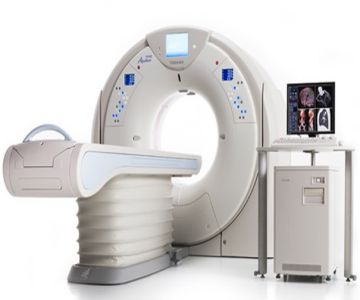At LCMC , newer, faster machines and techniques require less radiation and less exposure than was previously used.
Before Arriving for Your Exam
No solid food for three hours before exam. You can drink clear liquids, unless you are on restricted fluids.
Continue taking all of your current medications. Do not take Viagra®, Cialis® or Levitra® for 48 hours before exam.
Because you will need to wear a hospital gown for your exam, wear clothing that can be changed easily.
Leave all jewelry and valuables at home.
Harm to unborn babies - Tell your doctor if you're pregnant.
After Arriving
A radiology nurse or technologist will ask you a few questions regarding your medical history.
Please tell the technologist, radiology nurse and/or physician of any allergies you may have before your exam.
You will be asked to change into a hospital gown and a nurse or technologist will insert a small IV in your arm.
During Your Exam
While positioning you on an exam table, the technologist will explain your procedure and answer any questions you may have.
A contrast agent (dye) will be injected through your vein.
During the injection you may experience a warm sensation all over your body and a metal taste in your mouth. This is normal.
You will be asked to lie flat on your back. In some cases, pillows or straps may be used to keep the area being examined from moving during the scan.
The exam table will slide into the scanner, only covering the part of your body which is being studied. The scanner is open at the back and the front, allowing you to see out.
The technologist will always be able to see and hear you during your exam.
You may be asked to hold your breath for a short time while the scanner takes a series of pictures.
The images will be reviewed, and if necessary, some may be repeated.
This procedure usually takes approximately 15-30 minutes. Your total time commitment will be approximately an hour and a half.
Contrast material might be given to you:
- By mouth. If your esophagus or stomach is being scanned, you may need to swallow a liquid that contains contrast material. This drink may taste unpleasant.
- By injection. Contrast agents can be injected through a vein in your arm . You may experience a feeling of warmth during the injection or a metallic taste in your mouth.
- By enema. A contrast material may be inserted in your rectum to help visualize your intestines. This procedure can make you feel bloated and uncomfortable
Reactions to contrast material
Although rare, the contrast material can cause medical problems or allergic reactions.
Most reactions are mild and result in a rash or itchiness. In rare instances, an allergic reaction can be serious, even life-threatening. Tell your doctor if you've ever had a reaction to contrast material.
Preparing your child for a scan
If your infant or toddler is having a CT scan, the doctor may recommend a sedative to keep your child calm and still. Movement blurs the images and may lead to inaccurate results. Ask your doctor how to prepare your child
After Your Exam
You may resume your normal diet.You should drink plenty of fluids to help flush the contrast dye out of your system.
An imaging physician will examine your images and write a report of their findings. This report will be sent to your physician, usually within 24 hours. Some scans require more computers processing, and these may take longer to analyze. Your physician will contact you with the results of your exam.
After the examination, call immediately back the London Consulting Medical Center-026261661 extension 401 or 115 in case you experience general itchiness or shortage of breath.

